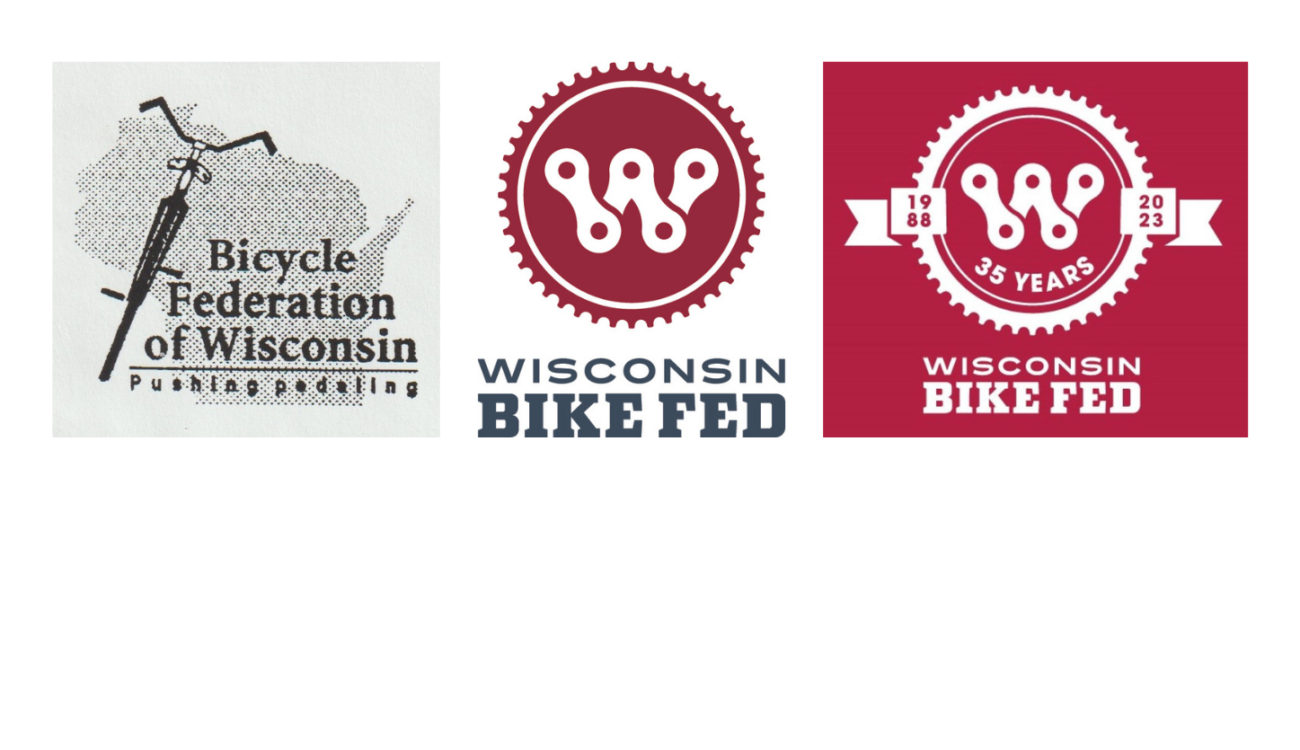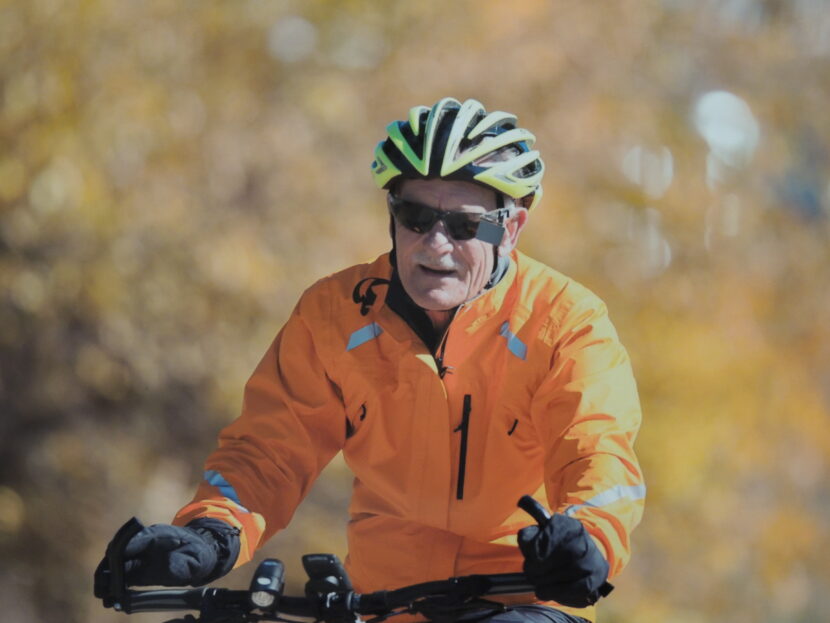
Origins and Early Days of The Bicycle Federation of Wisconsin
1986-1996
According to one of the founders of the the Bicycle Federation of Wisconsin, Bill Hauda, bicycle advocacy in Wisconsin was largely nonexistent and badly fragmented in 1986. A few individuals and bicycle club representatives did what they could to promote cycling at the local level, but there was no coordinated statewide effort. That was all about to change.
The Landscape…
Historically Madison had been the epicenter of cycling advocacy, and Bill Hauda served as vice president of the Madison Bicycle Brigade. The Brigade was a small group of cyclists who regularly pressured city and county government on issues like maintaining the University Avenue contra-flow lane, cleaning debris from the East Johnson Street bike lanes and other issues affecting local cyclists.
Hauda was also state legislative representative for the League of American Wheelmen (LAW) which was later re-named the League of American Bicyclists. LAW had created a nationwide grassroots organization that featured state representatives in all of the states.
There were two key LAW positions in each state: a state club representative who was responsible for membership and relations with affiliated clubs and a state legislative representative, whose function was to lobby in the interests of bicycles and stimulate the clubs to take action on bicycle issues when they arose. Douglas Kowalski of Milwaukee was the club representative and Hauda the state legislative representative.
Issues affecting the states that came to the attention of LAW were communicated to the state legislative representative. State legislative representatives would then relay the information to clubs, a few of which had advocacy designees, for local action. For example, LAW monitored federal highway plans and alerted the states to pending projects that might affect bicycling. As the state legislative representative, Hauda also lobbied the legislature, governor and state agencies when issues arose from time to time in state government. He was also free to initiate.
Because the system was driven from Baltimore, MD where LAW was then headquartered, and not from the state or the grassroots level, it was somewhat haphazard and not well coordinated, so its effectiveness was limited. Also, LAW represented individual cyclists and clubs. The rest of the bicycle industry – dealers and manufacturers – had their trade organizations, such as the Chicago Area Dealers Association (CABDA), which covered Wisconsin, but had little contact with cyclists.
The Inspiration…
After struggling with ways to improve communication, possibly bring bicyclists and the industry closer together so they could pursue common interests with much more influence and power, while also increasing local involvement, Hauda decided in 1986 that a few individuals operating for free out of their homes while juggling all the other things in their lives was not being effective. Wisconsin needed a formal umbrella organization to bring together local cyclists, clubs, dealers and manufacturers so that they could more effectively protect and promote the interest of cyclists.
With the assistance of John Cornelison, then administrator of LAW, Hauda researched and then drafted a constitution and bylaws for a proposed Bicycle Federation of Wisconsin (BFW). The word “federation” was highly significant because it signified an intent to bring together all Wisconsin cycling interests into a single organization.
The draft was distributed to several key LAW members in Wisconsin who acted as a sort of ad hoc board of the proposed organization:
- Bruce Germond, Rhinelander – President of Rhinelander Cycling Club
- Bill Hauda, Madison – LAW state legislative representative
- Ann Kaemmerle, Madison – former president of the Bombay Bicycle Club
- Susan Kavulich, Madison – state bicycle coordinator and former Bombay president
- Susan and Douglas Kowalski, Milwaukee – LAW club representative for Wisconsin
- Jeanette Deloya and Arthur Ross, Madison – Madison city bike coordinator
Getting Started…
Following a review of the draft constitution, the group moved ahead with forming the BFW. Hauda became “acting president” of the emerging organization by default and the soon-to-be BFW began operating out of the office of Common Cause in Wisconsin, for which Hauda was then serving as executive director.
In early 1987, Hauda applied to the Dane County Bicycle Association, a foundation that provides grants for bicycle projects, and received a $900 grant to fund a statewide bicycle conference aimed at creation of a state association “to represent and defend the interests of bicyclists.”
Arthur Ross and Hauda worked on the conference details, searching for a proper venue for the meeting. Ross eventually reserved a large room in the Madison Senior Center on Mifflin Street for the planned conference to formally launch BFW.
Hauda knew that good attendance was key. To get as many cyclists as possible to that conference, Hauda contacted Lon Haldeman and Susan Notorangelo, who held Race Across America (RAAM) records on both single bikes and tandem. Haldeman and Notorangelo agreed to present a slideshow on RAAM as a drawing card.
On April 30, 1988, about 50 bicyclists from around the state gathered in Madison to attend the first meeting of the Bicycle Federation of Wisconsin. The constitution and bylaws were approved, and Hauda became the organization’s first formal president, operating the BFW out of the Madison Common Cause office until the position was assumed by Richard Wilson of Green Bay. Wilson then operated the BFW out of his home, as it had no staff and limited funds.
Progress…
As membership grew and finances improved, BFW hired its first part-time paid executive director, Marcia Miquelon, in 1994, and the office returned to Madison.
When Miquelon left BFW to move to Colorado in 1995, BFW was engaged in a lobbying effort that was critical to bicyclists. Hauda stepped in as part-time executive director in November of 1995 and successfully lobbied one of the most significant pieces of pro-bike legislation to ever pass the Wisconsin legislature.
Assembly Bill 64, the so-called “bicycle bill” made numerous changes in state law, including granting bicyclists for the first time the same rights as motorists and eliminating the onerous prohibition against riding two-abreast. The bill was signed by Gov. Tommy Thompson and became law on March 2, 1996. One of Hauda’s most treasured mementos of that effort is one of the pens Thompson used to sign this immensely important law.
When the bicycle bill was enacted into law, Hauda decided to resign as executive director as of March 22, 1996. In July of 1996, Jeanne Hoffman was hired as a full-time executive director of the Bicycle Federation of Wisconsin.
Moving Forward…
Since 1996, the organization has continued to look out for cyclists around the state through the help of board members, staff, volunteers, members and supporters…all working together to move cycling forward in Wisconsin.

Bike Fed Gratitude: Our sincerest thanks to Bill Hauda for sharing this history with all of us to understand how a few dedicated residents can make a big impact. Bill discovered bicycling while training for triathlons, and his running accomplishments include 13 Boston Marathons. Although he has made adjustments to how he rides over the years, he has logged over 260,000 lifetime miles by bike and remains an active member of the Wisconsin Bike Fed to this day. When asked about achievements and goals for the organization, Hauda advised that we keep the focus on cycling, including improvements to road projects, and to keep increasing our reach and effectiveness. Why does Bill still choose to be a Bike Fed member? He hasn’t lost interest in road projects as they are very important, and he wants to continue serving the bicycling community. Thank you Bill!